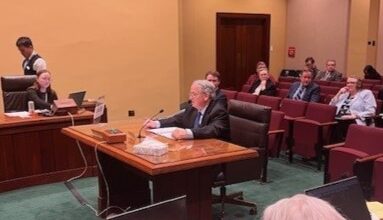Rep. Rudy Yakym Defends Administration’s Tariff Threats
The following is a report from The Elkhart Truth.
U.S. Rep. Rudy Yakym defended the administration’s use of tariffs to strongarm America’s closest allies while visiting businesses in his district that might be vulnerable to the tax on imported goods.
Yakym visited structural steel maker PWI at its 230,000-square-foot facility south of Nappanee, Indiana, on Tuesday. The company makes products including overhead cranes, fall protection systems and mezzanines, which are used by RV, boat and medical device makers in the region and by other industries nationally.
That includes supplying steel staircases used in SpaceX launch towers, according to President Ryan Miller, who owns the company with brothers Darren and Kyle Miller. Their father, Pail Miller, started PWI in 1979 as a welding shop for farm machinery.
“We decided to diversify in the avenue of, ‘Let’s take our products to the nation.’ That’s the success there,” Ryan Miller said. “We’re doing all the work in the RV industry, Forest River, Brinkley, Jayco. … Millions of dollars here in the community, tens of millions. Bus manufacturers in Atlanta, guys making glass in Wichita. There’s guys everywhere around the country that needs our stuff.”
Yakym visited the factory as part of his “Indiana Innovation Tour” in the 2nd District. The tour also includes Hose Assemblies in Mishawaka, Wabash Castings in Wabash and Topp Industries in Rochester.
“Indiana’s 2nd District is home to what I call the Americans who make the country work,” Yakym said. “It’s the back end of the country, I think it’s that part that nobody sees. When you’re driving your RV down the road … you’ve got your family in the RV and you’re just going for vacation. You don’t think about all of the workers that it took to make that RV, you’re not thinking about the cranes that it took to move all that stuff, or you’re not thinking about the people that built the cranes that move all that stuff.”
PWI owners including Ryan Miller and Darren Miller, who is vice president of engineering and product development, questioned Yakym on how the threat of tariffs might impact them. Trump’s threats against Mexico and Canada were placed on a 30-day pause when they were meant to go into effect at the start of February.
“If it’s Trump just using it as a leverage tool, a temporary leverage tool, it’s whatever,” Darren Miller said. “If it’s a two-year thing, it’s a big deal.”
His brother asked Yakym about his gut feeling for what might happen in 2025.
“Should we be actively – do you feel like our eggs should be moved to a different basket, long-term?” Ryan Miller said.
Yakym told the Millers that was a business decision they would have to make. He added that the RV industry understands that its supply chain needs to be diversified and not too reliant on China.
“There’s a couple sides to this. One is, what is the president doing from the tariff policy, but the other thing that we can’t control is, what does China attempt to do to us in terms of even their own export controls. There are certain things that China will look at in our macro economy and say, ‘We’re going to cut off X or Y or Z.’ And that’s beyond our control,” he said. “If I was doing business with China, I’d really want to know what are some of my alternatives.”
Yakym acknowledged that tariffs have been a hot topic on his manufacturing tour.
“We’re getting a lot of incoming feedback on that right now. We’re making sure that we are relaying that feedback to the administration,” he said. “I think the administration certainly wants to make sure that we are and will remain the manufacturing powerhouse that we are right now.”
Trump unilaterally announced an additional 25 percent tax on imports from Canada, with a lower 10 percent charge on oil, natural gas, electricity and other energy products, as well as an additional 25 percent tax on Mexican imports and another 10 percent on Chinese goods. The threat of the additional tax – which is paid by individuals and companies bringing in the goods, not by the exporting country – triggered retaliatory measures ranging from the promise of matching tariffs to an urging to Canadians by Prime Minister Justin Trudeau that they “choose Canadian products” when shopping.
Trump’s first round of tariffs in 2018 were effectively a $71 billion tax increase, according to Office of Management and Budget records. Their impacts included a $1 billion loss cited by General Motors, which said it would cut costs by eliminating around 14,000 jobs in North America and close five manufacturing plants.
Yakym said Trump wants to use tariffs as a tool when negotiating with other countries.
“Look at the way he leveraged tariffs back in his first administration, look at how he’s leveraging tariffs today. What the president wants to be clear about is making sure that we can use tariffs as a tool to negotiate with other countries. Sometimes it is, oh, we need a better trade deal. Sometimes they have unfair practices that we want to make sure that they stop,” he said. “There are all kinds of things that countries around the world do to take advantage of the United States.”
Trump emphasized illegal immigration and drug smuggling, rather than a trade imbalance, in orders announcing the new round of tariffs.
Asked whether threatening America’s closest trading partners with tariffs was worth any ill-will it fostered, Yakym defended Trump’s tariff threats. He pointed to Mexico’s 2023 ban on importing genetically modified corn out of health concerns, which was ended before Trump took office when a dispute panel ruled that Mexico violated its commitments under the U.S.-Mexico-Canada Agreement.
“When I have farmers in this district calling my office talking about how someone like Mexico is in violation of the USMCA because they banned certain types of corn that are grown here in this district, that’s a problem and we shouldn’t take that. Same thing with some of the products that we export to Canada. Canada takes advantage of us, or they put restrictions on that shouldn’t be there, in violation sometimes of our trade agreements,” Yakym said. “So I do support the president putting out a marker and saying we need to make sure that we have fair and reciprocal trade deals, and by the way, the trade deals that we’ve negotiated, we expect them to live up to.”
Read the full Elkhart Truth article here. Please note there is a paywall.


